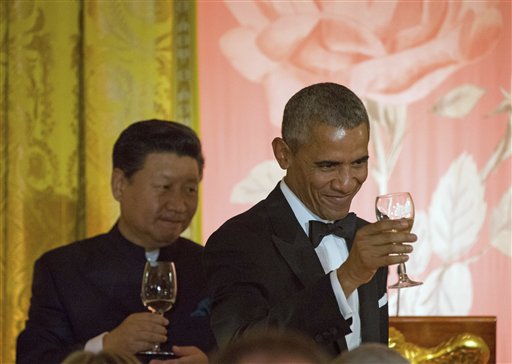China’s estimated 650 million Internet users don’t have access to Facebook, Twitter or a number of media websites. They can, however, build profiles and contacts on LinkedIn, thanks to that company’s willingness to comply with Chinese censorship rules.
Communication with the Chinese government is crucial to keeping LinkedIn’s path around the Great Firewall to that nation’s huge market open. And if that contact is at the very highest levels, so much the better — and reason enough for Reid Hoffman, CEO of the professional networking company, to have appreciated his invitation to last Friday’s White House state dinner for the Chinese president.
As an American business leader with interests in China, Hoffman was a logical pick to attend the fete. But Hoffman is more than that: He’s a major Democratic donor who gave $1 million to the super PAC backing President Barack Obama in the 2012 election. He gave $61,600 — the maximum allowed that cycle — to the Democratic Party. Since 2011, Hoffman has visited the White House four times, and got a meeting on Feb. 18 with the president himself in the White House residence.
All told, guests representing more than a few tech titans and other corporate interests at the China state dinner have contributed nearly $18.9 million since 2007 – $3.3 million to Democrats (candidates and party committees), $1.2 million to Republicans and $14.3 million to PACs and outside spending groups, a Center for Responsive Politics analysis shows. Each attendee brought a guest, which made for 30 pairs from U.S. corporations — 22 of which included at least one major donor who gave money to political causes at the federal level since 2007.
One seat at the head table with the president and Chinese President Xi Jinping went to Jeffrey Katzenberg, the head of DreamWorks Animation who’s given $5.4 million to support Democrats since 2007. Another was reserved for Salesforce.com CEO Marc Benioff, who helped finance Obama’s inauguration ceremonies to the tune of $167,800 and bundled more than half a million dollars for his 2012 campaign. He and his wife Lynne, who also attended the dinner, gave $122,400 to the Democratic Party in the 2012 cycle and have donated $222,300 to candidates and committees overall since 2007.
Benioff’s personal familiarity with Obama rivals Katzenberg’s among major donors: He has visited the White House 14 times, according to White House records, including for personal meetings in the Oval Office with the president. Katzenberg — whose own movie industry interests in China are detailed in a Sunlight Foundation report from 2012 — has visited 13 times.
Divining Benioff’s interest in Chinese policy isn’t as simple as identifying Hoffman’s. (Representatives for Salesforce.com and LinkedIn declined to comment on their executives’ attendance at the dinner.) LinkedIn is transparently in the middle of a months-long lobbying push to explain its “international business growth” to Washington, which, though the lobbying filings remain unclear, seems likely to include the site’s self-censorship of content objectionable to the Chinese government; the material invisible to Chinese users includes a video supportive of victims of the 1989 crackdown on protesters in Tiananmen Square.
Lobbying filings of Salesforce.com, a cloud-based platform for managing a company’s sales and marketing, mostly deal with the company’s support for National Security Administration overhaul proposals and opposition to mass government surveillance on the Internet.
But Salesforce.com cares quite a bit about trade secrets, according to an executive for the company who appeared last June on Capitol Hill to testify about the importance of a U.S. trade secrets law. “As long as our secret information is not accessible to others…the law in the U.S. provides powerful civil and criminal remedies to stop others who try to steal our own or our customers’ secrets,” he said at a congressional hearing.
Increasingly, trade secrets have been accessible — to Chinese hackers, who don’t operate under threat of U.S. legal action.That led Obama to address the theft directly in a Friday press conference with Xi, hours before the dinner.
“We’ve agreed that neither the U.S. or the Chinese government will conduct or knowingly support cyber-enabled theft of intellectual property, including trade secrets,” the president said.
Besides Benioff and Katzenberg, other guests at the dinner’s head table included Facebook CEO Mark Zuckerberg, Apple CEO Tim Cook and Walt Disney Company CEO Bob Iger. Together, those guests accounted for $6.7 million in donations to Democrats and Democrat-backing super PACs since 2007.
Still, major Republican donors were among the journalists, activists and other guests at the event. In fact, Larry Ellison, the CEO of Oracle, gave the most of any guest: $6.3 million overall — including $3 million to the super PAC backing Obama’s 2012 opponent, former Massachusetts Gov. Mitt Romney.
As of June 30, Ellison had already matched that donation with a $3 million contribution to the super PAC backing Sen. Marco Rubio‘s (R-Fla.) presidential bid. Katzenberg, too, has given recently: At least $1 million to Priorities USA Action — the super PAC boosting Hillary Clinton‘s campaign for the Democratic nomination.
Alex Baumgart contributed to this report.





